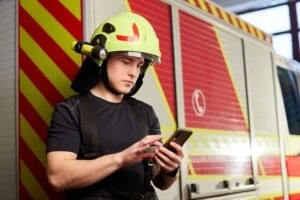
Yes – you can work as a firefighter with a DUI. That said, you might face a lot of hurdles depending on the department’s policies, the circumstances of your conviction, and whether or not you have shown proof of rehabilitation.
Pursuing a career as a firefighter is a noble aspiration, demanding physical endurance, mental resilience, and impeccable judgment. While a conviction for driving under the influence can complicate your career path, a Los Angeles DUI lawyer might be able to help.
The Impact a DUI Can Have on Your Firefighting Career
A DUI conviction is a serious offense that raises concerns about an individual‘s decision–making abilities and reliability. Since these characteristics are important for firefighters to embody, fire departments prioritize candidates who demonstrate responsibility and sound judgment.
While a DUI does not automatically disqualify you from becoming a firefighter, it does make the process more complicated. Just know that many departments have strict hiring standards, and as a result, they may view a recent DUI as a red flag, but talking to a lawyer can help.
When it comes to finding legal counsel, you might wonder, “How do I choose a Los Angeles DUI attorney?” The answer is to look for a law firm with experience handling DUI cases and representing clients in the firefighting industry.
For a free legal consultation, call (310) 896-2723
How Can a DUI Affect My Firefighter Certification?
A DUI conviction can seriously impact your ability to both obtain and maintain a firefighter certification. In California, fire departments often conduct extensive background checks, which will include any criminal convictions, including DUI offenses.
While a DUI may not automatically disqualify you, it can raise concerns about your judgment and reliability—both of which are qualities that first responders need to embody. Depending on the department’s policies, a recent DUI conviction may result in a delay or denial of certification.
It’s not uncommon for fire departments to prioritize candidates who demonstrate responsibility and sound decision-making, which a DUI can put into question. Some firefighter certification programs might even require a clean criminal record without any room for explanations.
What are the Long-Term Consequences of DUIs for Firefighters?
The long-term consequences of a DUI for firefighters can be perpetual, especially when it comes to job retention and career advancement. Even if you are initially hired, a DUI conviction can continue to affect your career over time.
Many fire departments have policies in place that require employees to maintain a clean criminal record. As such, a DUI conviction could lead to disciplinary action, suspension, or even termination, depending on the department’s policies.
Furthermore, firefighters are trusted with public safety, and any behavior that suggests impaired judgment or reliability can undermine the trust placed in them.
Here are other examples of ways a DUI conviction can impact your role as a firefighter:
- Reduce your eligibility for promotions or specialized roles within the department
- Prevent you from advancing in your career
- Limit your options for long-term career growth and financial stability
- Create ongoing legal and financial difficulties
- Make it harder to secure additional professional opportunities outside of firefighting
All that said, hope is not lost. You can take steps to address the issue through rehabilitation and legal options, like expungement. This is one of the ways you can mitigate the long-term consequences of a DUI in a way that lets you move forward with your career.
Factors Influencing Your Employment Prospects as a Firefighter with a DUI
Several factors can influence how a DUI affects your chances of becoming a firefighter:
- Time elapsed since the DUI: The more time that has passed since the conviction, the better. Some departments may be more lenient if the DUI occurred several years ago, especially if you’ve maintained a clean record since. Conversely, a DUI within the last few years could be a major barrier.
- Evidence of rehabilitation: Demonstrating that you’ve taken steps to address any underlying issues is a must. This can include completing substance abuse counseling, attending Alcoholics Anonymous meetings, or participating in other rehabilitation programs. Such actions show a commitment to personal growth and responsibility.
- Transparency and honesty: It is helpful to be upfront about your DUI during the application process. Attempting to hide or downplay your conviction can lead to automatic disqualification, especially if it surfaces during a background check. After all, honesty indicates integrity, which is a valued trait in the firefighting profession.
- Overall record and experience: A strong employment history, solid professional references, and proof of relevant experience can help offset the negative impact of a DUI. Demonstrating that you have been consistently responsible in other areas of your life can also reassure hiring committees of your suitability for the role.
Complete a Free Case Evaluation form now
Reach Out to a Los Angeles DUI Law Firm for More Information
While a DUI conviction presents a lot of challenges for people who aspire to become firefighters and for those already in the profession, it does not necessarily denote the end of your firefighting career. Contacting an attorney can make all the difference.
At Simmrin Law Group, we have decades of experience helping people just like you, and in that time, we have represented thousands of clients in situations like yours. With support from us, you can improve your chances of overcoming a DUI conviction as a firefighter.
Reach out to our law firm today to learn more about us and what we can do for you as you pursue your career as a firefighter.
Call or text (310) 896-2723 or complete a Free Case Evaluation form
